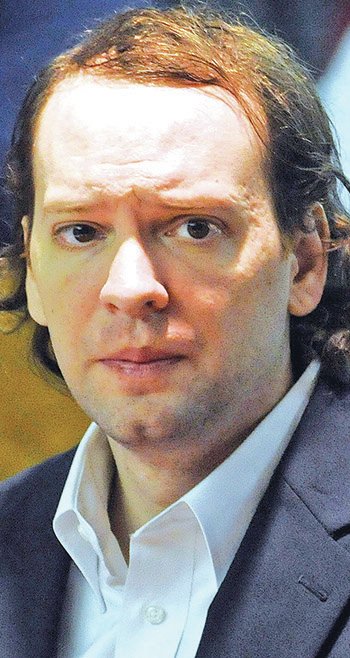FAYETTEVILLE -- A death row inmate from Washington County asked the Arkansas Supreme Court on Thursday for a new trial, claiming his trial attorney raised a valid insanity defense but then abandoned it in closing arguments.
Zachariah Marcyniuk, now 35, was sentenced to die by lethal injection for the murder of Katie Wood in March 2008.
Web Watch:
Watch the oral arguments in Marcyniuk’s appeal to the Arkansas Supreme Court in full at the following link:
Lee Short, Marcyniuk's appeals attorney, told justices there was no doubt Marcyniuk's actions caused Wood's death but said jurors never got to consider his defense of mental disease or defect.
The defense had expert witnesses who testified Marcyniuk suffered from major depression, a borderline personality disorder, was suffering a dissociative episode at the time he killed Wood and couldn't conform his actions to the law, Short said. When under stress, Marcyniuk became out of control.
Short said W.H. Taylor abandoned that defense in closing arguments at trial and diminished the credibility of his experts by urging the jury in closing arguments to return a verdict of second-degree murder to avoid the death penalty for Marcyniuk. Taylor said second degree fit the crime.
"There's a reasonable probability at least one juror would have found he was not guilty by reason of mental disease or defect," Short said. "He threw his experts under the bus. You don't have a right to plead your client guilty; that's exactly what took place here."
Valerie Fortner, an attorney with the Attorney General's Office, argued Marcyniuk shouldn't get a new trial because jurors heard all the evidence, including Marcyniuk's testimony, and could have found he was mentally ill but didn't.
"At no point in the trial did he steer away from mental illness," Fortner said.
Fortner pointed out Marcyniuk was highly intelligent, gainfully employed, going to school full-time and had plenty of friends who said he was normal and compassionate, making an insanity defense difficult to sustain. Marcyniuk also actively tried to hide the crime and escape.
"The level of credibility is great, and that's what W.H. was up against," Fortner said.
Prosecutor John Threet attended the hearing. Threet said attorneys have to be able to evaluate the evidence and adjust on the fly. Taylor's whole point was to keep Marcyniuk off death row, he said.
"To me, the premise of his argument was no matter how much water your ship is taking on, you gotta go down with it," Threet said of Short's argument.
The court will rule on the case at a later date.
Wood was a 24-year-old University of Arkansas student in 2008. She and Marcyniuk dated for a time, and she ended the relationship.
Marcyniuk broke into Wood's Fayetteville apartment in the early hours of March 9, 2008, and laid in wait for her. He attacked Wood when she opened her front door.
Marcyniuk dragged Wood inside her apartment and stabbed her more than 50 times. He left Wood's body in the bathtub and fled through a back window.
Marcyniuk was later arrested in Oklahoma during an unrelated traffic stop.
Marcyniuk's capital murder conviction and resulting death sentence were upheld by the Arkansas Supreme Court. Judges said there was ample evidence for a jury to believe Marcyniuk acted deliberately and with premeditation.
The high court then refused Marcyniuk's request for a rehearing and a mandate was issued. After a mandate has been issued, a convicted murderer can begin challenging the way his attorneys handled his case.
The appeals process in Arkansas for death penalty cases now averages more than a decade, according to prison officials.
NW News on 05/23/2014
